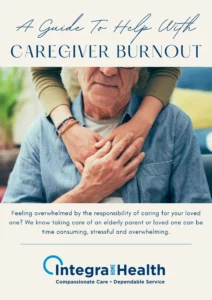When an elderly parent starts to need more help at home, it’s common to feel bound by duty to become a family caregiver. After all, your parents took care of your every need. Isn’t it time to return the favor?
But once you step into that role, you’re no longer just your parent’s son or daughter. Becoming a family caregiver means you might also be their chauffeur and their chef, their financial adviser and their housekeeper, their pharmacist and their physical therapist.
No wonder your emotions are all over the place: Everything in your life is affected by this decision, and you probably haven’t been trained to do the broad range of caregiving tasks you’re being asked to do (or feel responsible for).
Whether you’re a new caregiver or you’ve been caregiving for a while, these six tips for caring for elderly parents at home can help you feel informed, organized, and supported.
1. Get Educated
The first stages of becoming a family caregiver are the hardest because this is when you have the least information about what’s needed and expected, and when you feel the most insecure and uncertain in your role.
That’s why the first step is to learn about your loved one’s health, speak with their doctors to get information about what is likely to happen in the future, and ask a lot of questions. Here are some questions to start with:
- How is their physical health?
- How is their mental health?
- How can I help them improve their health?
- What can I do to keep them healthy and safe?
- Should my parents make any lifestyle changes? If so, what are your recommendations?
- Are they able to live alone?
- Are they safe to drive?
- What medications have you currently prescribed? What are the dosages? Are there any specific side effects you’ve noticed?
As an essential partner in your parent’s health care team, you have the right to be trained to provide care. For example, if your mom has Alzheimer’s, ask about where you can get information about how to communicate with someone with memory loss. If your dad needs help getting from the bed to a chair, where can you get training on transferring someone or helping them walk?
Getting information and training will help you feel confident about what lies ahead.
2. Review or Create Legal Documents
To more efficiently and effectively work with your parent’s health care team, ask if they’d be willing to sign the federal Health Insurance Portability and Accountability Act (HIPAA) form, which permits health care professionals to share medical information about your parent with you. Some doctors will divulge information if your parent gives oral approval, but having the HIPAA form ensures you’ll get answers.
Your loved one’s situation is not going to stay the same, so make sure you plan for the future:
- Is there a will? A trust?
- Has your parent created an advanced directive (also known as a living will) that tells health care professionals what kinds of care they want or don’t want if they can’t participate in a discussion?
- Has your parent chosen a health care power of attorney (also known as a health care proxy) to make medical decisions on their behalf if they become unable to?
- Have they chosen a financial power of attorney to make financial, tax, and legal decisions on their behalf if they lose their decision-making capacity?
3. Get on the Same Page with Your Siblings
If you have siblings or other involved family members, it’s imperative that you get — and keep — everyone on the same page. Consider holding a family meeting where you can discuss medical care, living arrangements, how caregiving tasks can be divided, and how to pay for what insurance doesn’t cover.
4. Connect with Community Resources
Don’t walk this journey alone. There are many community organizations, groups, and agencies that offer caregivers a variety of resources, ranging from support services to advice on caring for elderly parents, including:
- Eldercare Locator
- National Association of Area Agencies on Aging
- Veterans Administration
- Alzheimer’s Association
- Adult day care
- Home care
- Meals on Wheels
- Caregiver support groups
- Employee assistance programs
5. Set Boundaries
It’s critical that you learn to say “No” and “I need your help.” It might feel like the hardest thing you have yet to do as a caregiver, but it will make life easier in the long run.
If you don’t set healthy boundaries, caregiving can quickly lead to stress, burnout, poor health, and losing sight of your own personal life. So be realistic about the number of hours you can dedicate to caregiving without sacrificing the responsibilities of your job, household, and family. Lean on help from nearby relatives, community resources, or professional care to fill in the remaining gaps.
Among the chaos, make sure you “put your oxygen mask on first” so you are able to help your loved one to the best of your ability.
6. Let Go of Guilt
Caregiving is bound to bring up a ton of emotions, but guilt is one of the hardest to cope with. Whether you feel guilty about not having done enough, getting impatient with your parent, not doing a “good enough” job, or thinking about your own needs, it’s time to let that go.
Give yourself credit for doing the best you can in one of the toughest jobs there is. If you realize that even your best is not meeting all of your loved one’s needs, then it’s time to change the situation and ask for help.

